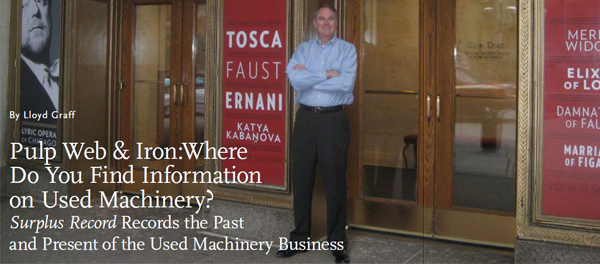Today’s Machining World Archive: April 2010 Vol. 6, Issue 03

Behind Tom Scanlan’s desk at the office of Surplus Record in downtown Chicago sits an old manual Royal typewriter. It’s a reminder to Tom of the roots of the information business his grandfather started 87 years ago to help transform the “junk” business into a more prestigious “machinery” business.
Surplus Record is a stubby 5” x 8” monthly digest of thousands of listings of used machinery offered for sale by dealers. Sixty-five thousand copies hit mailboxes each month, and the publication has more than double that number on its well-massaged circulation list. It also has around 60,000 listings on its Web site, which averages about 7,000 searches a day in its database.
But Tom told us the typewriter served another purpose during the height of Internet bubble hysteria when he was listening to offers to buy the family company almost weekly.
Scanlan said that Surplus Record was an attractive business to the dot-com guys because of its content. “They had more money than anyone in the machine tool world had ever dreamed of. These were the fastest talking, most educated and unknowledgeable guys about the machinery business. We were pretty far along on the Internet, but I wanted to soak up all the knowledge I could get out of them. So when these guys in their 20s and 30s came in, I hid all of the computers and modems and pulled out the old Royal and carbon paper so they would think they could transform our business. Some of those guys were so arrogant,” Scanlan recounted.
Tom ultimately did sell the business to Ariba Corporation in 2000. “It was a family decision. I have two sisters and a brother who were not in the business. If I had owned Surplus Record 100 percent, I never would have sold it.”
But Tom has continued to run the firm while remembering its Royal typewriter origins and investing heavily in the data systems that make the company relevant in 2010.
Noah Graff and I wanted to get Tom Scanlan’s take on the used machinery industry that he and his family have been immersed in since machine buyers would hop on the New York Central sleeper from Cleveland to check out the Kearney and Trecker mills on Lake Street in Chicago.
“My grandfather would walk down Lake Street hustling ads. The dealers would often be loading or working on the machines. He would urge the guys to put on a jacket and tie so the customers would have more respect for them,” according to Tom.
The senior Thomas Scanlan helped start the Machinery Dealers National Association (MDNA) in 1941. The association’s office was at Surplus Record, and housed its first board meeting there. “Josephine Corcoran, who became my step grandmother, was the first executive secretary of the MDNA,” Scanlan recounted.
Tom has a long perspective on the machinery business. Fresh energy came into the business when the World War II veterans got to sell war assets to other veterans who were starting up in manufacturing. They rode the Korean War build-up and infrastructure build-out in 1950s and 1960s into the Vietnam War. Tom said Vietnam fueled the machine tool business, but listings in the magazine went down because dealers had no inventory to advertise.
During the 1970s business grew moderately. Tom’s father diversified into chemical, oil and gas processing machinery listings, which compensated for slackness in metalworking. The oil boom in the seventies saw the development of the Texas and Oklahoma machinery markets.
In the 1990s Tom was running the business and watching the movement of manufacturing, first to Japan and then China. Surplus Record’s business grew slowly as more brokers entered the machining business. More transparency was coming into the business as pricing became less of a mystery, traditionally known only by stocking dealers in the old dealer fraternity. eBay was starting to be a factor and auctions were becoming a preferred way for firms to dispose of equipment.
These trends continued into the post 2000 decade. Tom sees the distinction between dealer and auctioneer dissolving as the Web software to conduct auctions has come down in price. Several dealers have morphed into auctioneers while maintaining traditional used machinery distribution firms. New dealers are selling used, and some used machinery firms have added new machinery lines. Scanlan used to shun auction ads, now he takes them gladly.
Surplus Record continues its dealer protection policy by refusing listings of machinery for sale by end users. Scanlan travels one or two days a week visiting his dealer clients in their offices and maintains cordial relations with the MDNA, despite a 41-year annoyance that the association his family helped start became his competitor through its Locator book and database.
Scanlan views eBay and its close ties with Google as major competition. eBay’s auctions have been debased by piracy and manipulation, but it is still a significant machinery advertising medium, though Tom regards its listing organization as confusing and less effective than his own.
Surplus Record has pulpy bound volumes of the monthly magazine prominently displayed for visitors who come to its offices. Tom believes in the value of the printed listings and has eight employees assiduously working on mail circulation daily. But he knows that the whole enterprise depends on the Web.
Surplus Record is a hybrid family business—run by a third generation Scanlan, but owned by a publicly held Internet firm. Many of its customers are multi-generational family firms. The machinery business that Surplus Record has always been a part of is iron based, information dependent and family driven—as it has been for 87 years. Pulp, Web, used machinery and Scanlan continue to flourish together.
